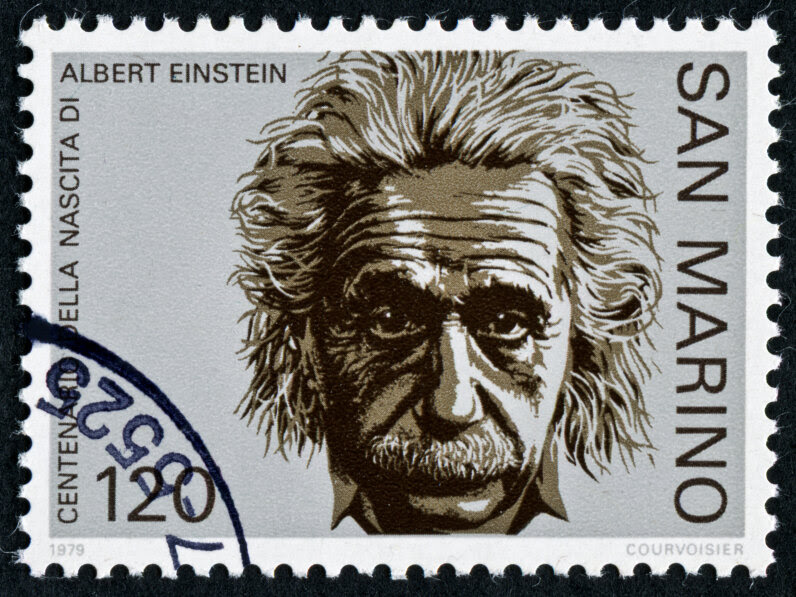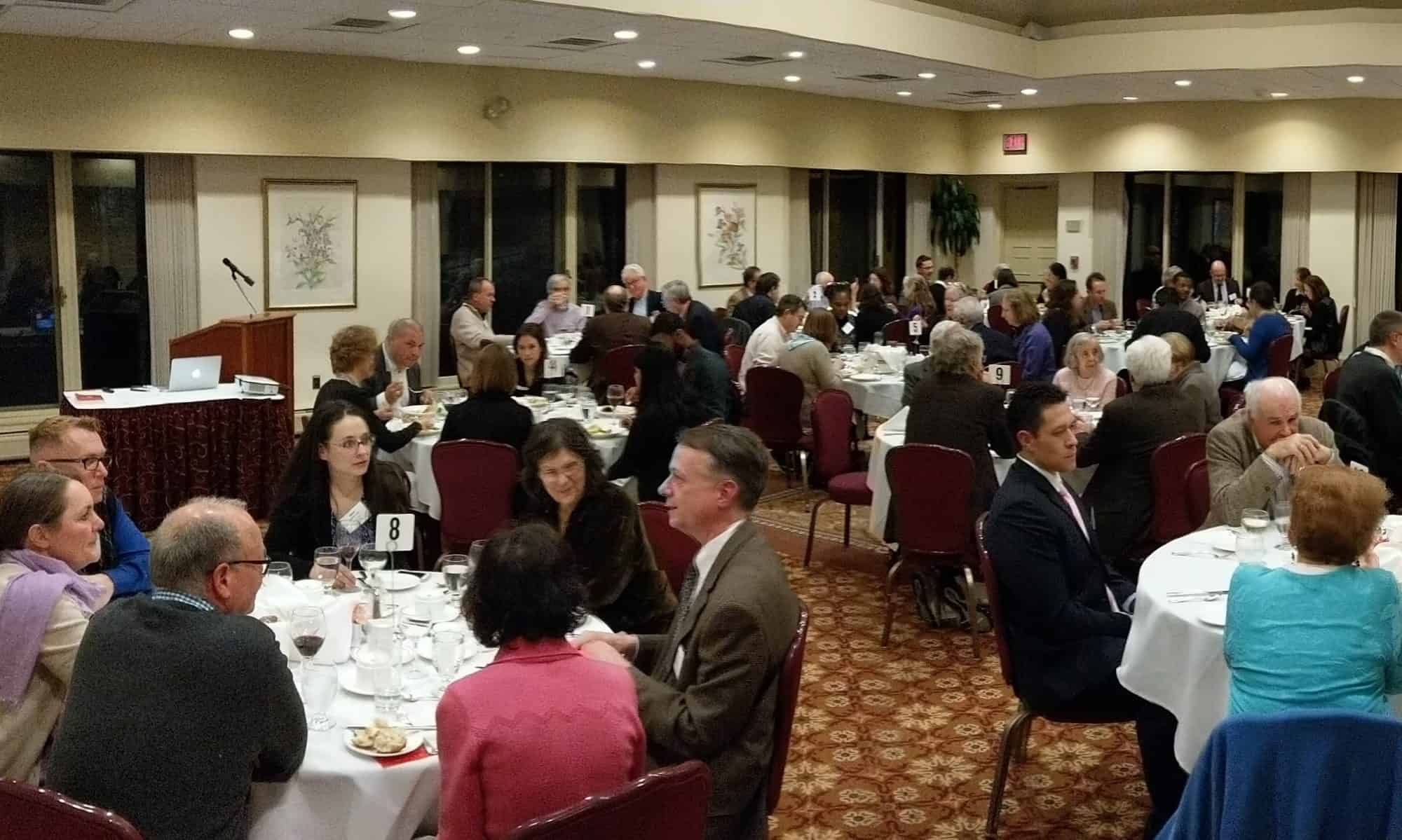Click Next Event to learn more and register online now.
Undergrads benefiting from dining together…
Fun article in the BDH about students intentionally having dinner and discussion with other students they don’t know.
Great discussions on March 8th!
Check back here this summer to learn more about our next event in Fall 2017!

Another historic precursor to our Roundtable Dinners . . .

The Founders were humbler than today’s Washington elite.
EDITOR’S NOTE: The following article is excerpted from Michelle Fields’s new book, Barons of the Beltway: Inside the Princely World of Our Washington Elite — and How to Overthrow Them.
‘What do you do?” may be the No. 1 question asked in the Washington, D.C. Beltway. It achieves two things: It gives the asker the opportunity to brag about their own job title and lets them know whether the person they’re talking to is worth their time.
Job titles and associations are the lifeblood of D.C. You’re no one unless you have a title, whether it’s “congressman,” “ambassador,” “chief of staff,” or an impressive title at a firm or media company. Unlike most jobholders in America, politicians in D.C. get to keep their titles for life. Think about it: You can be the CEO or vice president of the largest corporation in America, but once you leave that job, so goes the title. In Washington, D.C., you can have the title of “president,” “congressperson,” or “senator,” and that is your title for life. It doesn’t matter if you were a terrible congressperson who served only one term; you will forever be referred to and introduced as a “congressman” or “congresswoman.”
It’s bizarre perks of D.C. power such as this that draw thousands of young, type-A recent college grads to Washington — out of a desire not to serve our country but to get a title. And if you don’t have a title, good luck getting someone to talk to you for longer than two minutes. Washington is a town obsessed with titles and where being an obnoxious blowhard is socially acceptable. But it wasn’t always like this, and it’s certainly not what our Founding Fathers envisioned.
When President Thomas Jefferson held parties, he refused to use his title. In his eyes, titles were the obsession of monarchies, not of democratic nations. So he would send out invitations to official engagements using his own name rather than “president.” He replaced bowing with the shaking of the hand.
And the dinners thrown by our Founding Fathers didn’t include them wearing $12,000 designer jackets or eating with gold cutlery like our federal officials today. They understood their important role in setting a precedent for future generations and their role in conveying to the world the ideals of their young country. They did everything they could to distance themselves from the opulent lifestyles reminiscent of a monarchy. Jefferson proudly wrote in 1802 that he and the Founding Fathers “have suppressed all those public forms and ceremonies which tended to familiarize the public eye to the harbingers of another form of government.”
Jefferson wanted to ensure that the pomp and show of European courts was eliminated during dinnertime, and that instead the simplicity and informality of America were represented. He would wear austere clothing that he believed best reflected rural values. And when it came time for parties and social functions, Jefferson would go out of his way to ignore the aristocratic protocols of his former country. He insisted that round tables be used at dinners in order to project the democratic spirit of America. He didn’t like the rectangular tables used at royal functions, which would seat guests according to their rank and status. Jefferson figured that, at a round table, no one could sit at the head and no one could mistake him for a king. He believed that “when brought together in society, all are perfectly equal, whether foreign or domestic, titled or untitled, in or out of office.”
When the British minister to the United States, Anthony Merry, and his wife paid a visit to President Jefferson’s White House, Secretary of State James Madison accompanied them. The Merrys were excited and arrived wearing their finest clothing for the exciting introduction. Mr. Merry was in full diplomatic dress, even wearing a ceremonial sword and gold braid. But when they arrived at the main hall in the residence, they were flabbergasted — where was President Jefferson? The couple was accustomed to royal protocol, which said that the president ought to be waiting for them in the reception room. They stood there impatiently, but Jefferson was nowhere to be found.
Since Jefferson wasn’t there, James Madison went to look for him with Mr. Merry. As they were walking through a passageway, Jefferson popped out of his study and greeted them. Merry was shocked — appalled. Not only did the president break protocol by failing to greet them upon their arrival, but he also wasn’t even dressed for the occasion! Merry, dressed in his ceremonial sword and lavish outfit, felt ridiculous standing in front of President Jefferson, who was dressed casually in unceremonious workday clothing and wearing slippers.
According to Merry, the president of the United States was “not merely in an undress but actually standing in slippers down at the heels, and both pantaloons, coat, and under-clothes indicative of utter slovenliness and indifference to appearances, and in a state of negligence actually studied.” The Merrys assumed that Jefferson’s informality had to be a mistake. They thought that maybe they had just caught President Jefferson at a bad time. He must have been utterly embarrassed. But Jefferson’s casualness was deliberate His relaxed style was meant to send a message to his foreign guests: America was different. It was not meant to be a personal insult to Ambassador Merry. It was meant to send a message to Great Britain about America’s values.
A few days later, the Merrys were invited back to the White House for an official dinner. They were told to meet for a reception in the drawing room before dinner. They were hesitant to return but accepted the invitation under the assumption that they would likely be the guests of honor and treated exceptionally well as an apology for the embarrassing incident earlier. As they waited in the drawing room they figured that President Jefferson would arrive and apologize profusely. Jefferson did no such thing.
Jefferson arrived when it was time for dinner. Rules of protocol were such that Jefferson was supposed to take the arm of Mrs. Merry and escort her to the table. Instead, Jefferson took the arm of Dolley Madison, who served as the White House hostess for the widowed Jefferson. Jefferson escorted Madison to the table and ignored the shocked Mrs. Merry. Mr. Merry was furious to say the least. What kind of country was this man running?
To make matters worse, when the Merrys arrived at the dinner table they realized that there wasn’t a seat designated for them. They figured there must be a mistake. The Merrys were accustomed to attending events where they were seated according to their rank. However, Jefferson’s seating arrangement was pell-mell. It was a first-come, first-served arrangement, so all guests were seated according to how quickly they sat at the table. Mr. Merry was forced to scramble and compete for seats with other, socially inferior guests.
The Merrys viewed Jefferson’s irreverence toward foreign dignitaries — and others accustomed to royal treatment — as insulting. But Jefferson felt that the informality was necessary. He wanted to send a clear message that America was democratic and that he wasn’t going to carry on the arbitrary rules and protocol that dictated royal life. He didn’t care if Merry had some fancy title. He wanted to show the couple that in America royal titles would be obsolete and all would be treated equal. One doesn’t get a good seat simply because one has a title.
— Michelle Fields is a contributing reporter for the Huffington Post. This piece is reprinted from Barons of the Beltway: Inside the Princely World of Our Washington Elite — and How to Overthrow Them. Copyright © 2016 by Michelle Fields. Published by Crown Forum, an imprint of Penguin Random House LLC.
Another great event!
Thank you to all our participants at our March 7th roundtable event. Please check back here in the coming months for an update on our next event.
Our first event in 2016: Monday, March 7th
Register now for our upcoming event on Monday, March 7th at the Brown Faculty Club. Click “Next Event” above for more details.
Prospective roundtable presenter: Marcelo Gleiser
We may consider inviting Professor Gleiser to our a future roundtable event. He’s already spoken at roundtable events at Dartmouth and Amherst College with great success and outstanding reviews. Below is a recent article he wrote.
— Marcelo Gleiser is a theoretical physicist and cosmologist, and professor of natural philosophy, physics and astronomy at Dartmouth College. He is co-founder of the NPR science blog 13.7, a prolific author of papers and essays, and active promoter of science to the general public. His latest book is The Island of Knowledge: The Limits of Science and the Search for Meaning.
SCIENCE — 13.7 BLOG
The Equation That Blew Up The Cosmos

On this very day 100 years ago, while Europe was buried deep in the darkness of the Great War, Albert Einstein wrote down the equation that changed forever the way we understand space, time and matter.
To a large extent, the equation also changed the way we understand ourselves, as suddenly, from its folded mathematical convolutions, the universe itself became a dynamic, evolving entity, endowed with a history. Within this history, the birth and death of stars, and the creation of the chemical elements and their gathering into complex compounds in nascent planets, became a persistent feature. Life unfolded here, as it could have elsewhere, as part of this grand cosmic drama of which we are integral players. Big Bang, black holes, warped spacetime, wormholes, time machines, even our GPS devices all depend in some way on Einstein’s remarkable creation, a new way to describe gravity.
I can’t resist writing the equation down:
Rmn – ½ gmnR = 8pG Tmn
The reader no doubt recognizes the equal sign that separates the two sides. The arcane-looking symbols on the left describe the geometry of space and the flow of time; the Tmn on the right describes how energy and matter are distributed in space, whether moving or not. (G is the gravitational constant that already appeared in Newton’s theory of gravity from 1686.) In other words, the equation relates the geometry of space and the flow of time — now malleable quantities, amenable to distortions — to the distribution of matter in space. As the great physicist John Archibald Wheeler once wrote, matter tells space how to curve and space tells matter how to move. This is the essence of Einstein’s theory of general relativity, a theory that many physicists consider the most beautiful ever conceived.
Einstein was convinced his theory was correct even before it was tested. A journalist asked him what he would do if the theory was wrong. His reply became famous: “Then I would feel sorry for the good Lord. The theory is correct.”
Fortunately for the good Lord and for Einstein, the theory is correct. Einstein’s amazing predictions from the theory were verified to high accuracy: light from distant stars is bent as it passes nearby other stars on its way to Earth; time slows down in strong gravitational fields; Mercury’s orbit slowly precesses like a wobbling top due to its proximity to the sun. In other words, a large gathering of matter (and hence energy due to the E=mc2 formula, another one of Einstein’s creations, this one from 110 years ago) bends the geometry of space and affects the flow of time in measurable ways.
Einstein would no doubt be happy to know that his theory is not complete. As we celebrate 100 years of general relativity around the world, many questions remain open, questions that would no doubt astound Einstein.
For example, if we apply his theory to the universe, it predicts, as we go back toward the beginning of time, that space contracts to a point with zero volume and infinite energy. Clearly, such an absurd situation can’t be how the universe began its history. When an otherwise robust theory displays such “singularities,” we know something is wrong. What’s wrong here is that we cannot apply Einstein’s theory of gravity very close to the beginning of time, aka the Big Bang. Something else is needed, presumably a theory that is not afraid to face small distances, such as the quantum theory that describes the behavior of atoms and subatomic particles. But we still don’t know how to handle this marriage of the quantum and Einstein’s relativity.
In 1998, another cosmic mystery surfaced with the discovery that the universe is not just expanding but it does so at an accelerated clip. This phase apparently started some 5 billion years ago or so, for reasons that remain obscure. The amazing thing is that something like 70 percent of the stuff that fills the cosmos is working to feed this cosmic acceleration — and we have no clue what this stuff, called dark energy, is. Some claim it’s a new field with bizarre properties; others claim Einstein’s theory needs editing and it can’t be the final word.
In the best possible way, Einstein’s beautiful theory leads to beautiful experiments that test its validity — and to beautiful models that try to extend its validity into realms far removed from current experiments. Newton’s theory inspired magnificent work on celestial dynamics that has been feeding the imagination of physicists and mathematicians for more than 300 years. We now live under Einstein’s spell, in the bizarre cosmos that emerged from his theory. We are only beginning to explore all that is hidden within those arcane symbols.
Einstein, who disliked black holes, would be aghast if he knew that practically every galaxy has a giant one in its center. But he would surely be very pleased with the revolution he started, a source of wonder and inspiration for this generation and many more to come.
Happy centennial birthday, general relativity!
— Marcelo Gleiser is a theoretical physicist and cosmologist, and professor of natural philosophy, physics and astronomy at Dartmouth College. He is co-founder of the NPR science blog 13.7, a prolific author of papers and essays, and active promoter of science to the general public. His latest book is The Island of Knowledge: The Limits of Science and the Search for Meaning.
Another great event on Oct. 1st!
Register NOW for our next event on Thursday, October 1st
“The Mystery of Cosmological Constants: Evidence for the Existence of God?”
Our next event will feature Professor Walter Bradley and Dr. Randy Isaac who will be discussing whether or not cosmological constants provide evidence for the existence of God. Professor Bradley says yes, Dr. Isaac says no. Both are long time friends and so their presentations and interactions will make a great start for our dinner discussions.
6:00pm Thursday, October 1 – REGISTER NOW
More info. and speaker bios here. Please see the pre-event readings that will help frame our dinner discussions.
Future roundtables
Thank you to everyone who helped our first year of roundtables a great success! Please check back here this summer for details on our next Providence Roundtable in the coming academic year.
In the meantime, consider checking out where it all started in Boston. On Thursday, May 14th is the next Cambridge Roundtable addressing the topic of “Science and the Modern World?” with Harvard Professor of the History Science, Steven Shapin. Click here to register.


